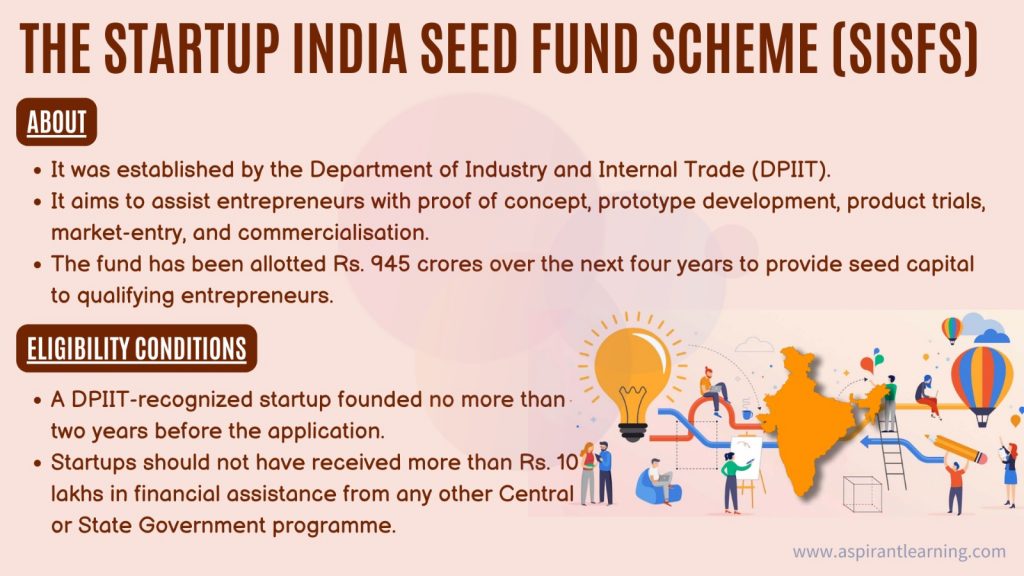News Highlight
The Government intends to build a strong ecosystem for nurturing innovation and startups in the country.
Key Takeaway
- To meet the initiative’s objectives, the Government unveiled an Action Plan for Startup India that laid the foundation of Government support.
- The Action Plan comprises 19 action items spanning areas such as “Simplification and handholding”, “Funding support and incentives”, and “Industry-academia partnership and incubation”.
- Realising the action items, various programs are implemented by the Government under the Startup India initiative to recognise and develop.
- As well as to promote the startups to be able to raise private investments.
Startup India
- About
- Startup India is a government of India project.
- The Indian Prime Minister initially unveiled the campaign in his speech from the Red Fort in New Delhi on August 15, 2015.
- The inaugural tournament took place on January 16, 2016.
- This initiative’s action plan focuses on three areas:
- Handholding and simplifying.
- Incentives and funding assistance.
- Collaboration and incubation between industry and academia.
- A startup is defined as a company headquartered in India.
- It was founded less than a decade ago and had an annual revenue of less than Rs 100 crore.
- Benefits
- To lower patent registration fees.
- The Bankruptcy Code has been amended to ensure a 90-day departure window.
- To exclude the first three years of operation from mystifying inspections and capital gains tax.
- To establish an innovation cluster as part of the Atal Innovation Mission.
- 5 lakh schools will be targeted, with 10 lakh youngsters participating in innovation-related programmes.
- To create new methods that will protect startup companies’ intellectual property rights.
- To promote entrepreneurship across the country.
- To promote India as a global start-up hub.
Programs to Support Startups
- Fund of Funds for Startups (FFS) Scheme
- To satisfy startups’ funding needs, the government launched FFS with a capital of Rs. 10,000 crores.
- The monitoring agency is the Directorate for Promotion of Industry and Internal Trade (DPIIT).
- The Small Industries Development Bank of India (SIDBI) is the operational agency.
- It has not only made funding available to entrepreneurs in the early, seed, and growth stages.
- Nonetheless, it also acted as a catalyst in facilitating the raising of domestic money, reducing reliance on foreign capital, and stimulating the formation of new venture capital funds.
- Support for Intellectual Property Protection
- The government established Start-up Intellectual Property Protection (SIPP).
- It enables startups to file patent, design, and trademark applications in appropriate IP offices through registered facilitators while simply paying the statutory fees.
- The government pays the facilitation charge for any number of patents, trademarks, or designs, while startups pay the statutory fees.
- Compared to other companies, startups receive an 80% discount on patent filings and a 50% discount on trademark filings.
- States’ Startup Ranking Framework (SRF)
- The Startup Ranking Framework for States is a one-of-a-kind programme that harnesses the power of competitive federalism.
- Furthermore, it fosters a thriving entrepreneurial ecosystem in the country.
- The ranking exercise’s primary goals are to help states recognise, learn, and replace successful practices.
- In addition, the government’s policy interventions to promote startup ecosystems and increase state competitiveness are highlighted.
- TIDE 2.0 Scheme
- TIDE 2.0 stands for Technological Incubation and Development of Entrepreneurs.
- It was launched in 2019 by the Ministry of Electronics and Information Technology (MeitY).
- Its goal is to foster tech entrepreneurship by providing financial and technical assistance to incubators that support ICT businesses leveraging new technologies such as;
- IoT, AI, Blockchain, Robotics, and so on.
- The Plan is being carried out through 51 incubators in a three-tiered framework.
- The goal is to boost incubation activities at prestigious research institutions and universities.

Conclusion
- Startups in India are experiencing a golden era in the history of Indian entrepreneurship.
- Even though the Indian government still has a critical role in promoting India as the World’s Tech Garage.
- The global emphasis is shifting towards boosting female entrepreneurs and establishing an inclusive and inventive workplace.
- Several stakeholders in the Indian startup ecosystem are also working to elevate domestic legislation in line with global trends.
- The state government’s role in building the necessary infrastructure and assistance to encourage the startup ecosystem becomes critical.
- Owing to infrastructural and supporting service restrictions, India must rely on low-cost, high-impact solutions.
Pic Courtesy: freepik
Content Source: PIB



